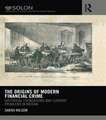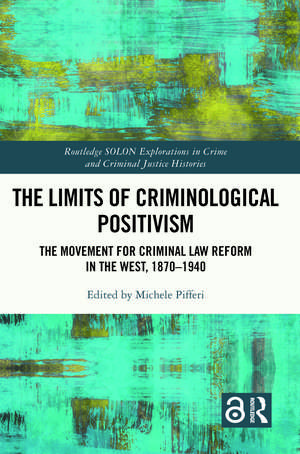The Limits of Criminological Positivism: The Movement for Criminal Law Reform in the West, 1870-1940: Routledge SOLON Explorations in Crime and Criminal Justice Histories
Editat de Michele Pifferien Limba Engleză Paperback – 31 mai 2023
The volume will explore those limits and bring to life the resulting doctrinal, procedural, and institutional compromises of the early twentieth century that might be said to have defined modern criminal justice administration. The book examines the topic not only in North America and western Europe, with essays on Italy, Germany, France, Spain, the United Kingdom, Belgium, and Finland but also the reception and implementation of positivist ideas in Brazil. In doing so, it explores three comparative elements: (1) the differing national experiences within the civil law world; (2) differences and similarities between civil law and common law regimes; and (3) some differences between the two leading common-law countries. It interrogates many key aspects of current penal systems, such as the impact of extra-legal scientific knowledge on criminal law, preventive detention, the ‘dual-track’ system with both traditional punishment and novel measures of security, the assessment of offenders’ dangerousness, juvenile justice, and the indeterminate sentence. As a result, this study contributes to a critical understanding of some inherent contradictions characterizing criminal justice in contemporary western societies.
Written in a straight-forward and direct manner, this volume will be of great interest to academics and students researching historical criminology, philosophy, political science, and legal history.
Chapter 2 of this book is available for free in PDF format as Open Access from the individual product page at www.routledge.com. It has been made available under a Creative Commons Attribution-Non Commercial-No Derivatives 4.0 license.
| Toate formatele și edițiile | Preț | Express |
|---|---|---|
| Paperback (1) | 326.49 lei 3-5 săpt. | +22.67 lei 5-11 zile |
| Taylor & Francis – 31 mai 2023 | 326.49 lei 3-5 săpt. | +22.67 lei 5-11 zile |
| Hardback (1) | 1005.34 lei 6-8 săpt. | |
| Taylor & Francis – 22 noi 2021 | 1005.34 lei 6-8 săpt. |
Din seria Routledge SOLON Explorations in Crime and Criminal Justice Histories
-
 Preț: 332.70 lei
Preț: 332.70 lei -
 Preț: 318.95 lei
Preț: 318.95 lei -
 Preț: 310.95 lei
Preț: 310.95 lei -
 Preț: 466.88 lei
Preț: 466.88 lei -
 Preț: 406.63 lei
Preț: 406.63 lei -
 Preț: 436.14 lei
Preț: 436.14 lei -
 Preț: 449.41 lei
Preț: 449.41 lei -
 Preț: 356.64 lei
Preț: 356.64 lei -
 Preț: 432.12 lei
Preț: 432.12 lei - 23%
 Preț: 351.68 lei
Preț: 351.68 lei -
 Preț: 388.42 lei
Preț: 388.42 lei -
 Preț: 387.91 lei
Preț: 387.91 lei -
 Preț: 371.30 lei
Preț: 371.30 lei -
 Preț: 382.86 lei
Preț: 382.86 lei -
 Preț: 385.71 lei
Preț: 385.71 lei -
 Preț: 383.17 lei
Preț: 383.17 lei -
 Preț: 349.53 lei
Preț: 349.53 lei -
 Preț: 389.66 lei
Preț: 389.66 lei -
 Preț: 389.66 lei
Preț: 389.66 lei - 18%
 Preț: 1116.38 lei
Preț: 1116.38 lei
Preț: 326.49 lei
Nou
Puncte Express: 490
Preț estimativ în valută:
62.48€ • 64.99$ • 51.58£
62.48€ • 64.99$ • 51.58£
Carte disponibilă
Livrare economică 24 martie-07 aprilie
Livrare express 08-14 martie pentru 32.66 lei
Preluare comenzi: 021 569.72.76
Specificații
ISBN-13: 9781032133539
ISBN-10: 1032133538
Pagini: 302
Ilustrații: 2 Halftones, black and white; 2 Illustrations, black and white
Dimensiuni: 156 x 234 x 19 mm
Greutate: 0.45 kg
Ediția:1
Editura: Taylor & Francis
Colecția Routledge
Seria Routledge SOLON Explorations in Crime and Criminal Justice Histories
Locul publicării:Oxford, United Kingdom
ISBN-10: 1032133538
Pagini: 302
Ilustrații: 2 Halftones, black and white; 2 Illustrations, black and white
Dimensiuni: 156 x 234 x 19 mm
Greutate: 0.45 kg
Ediția:1
Editura: Taylor & Francis
Colecția Routledge
Seria Routledge SOLON Explorations in Crime and Criminal Justice Histories
Locul publicării:Oxford, United Kingdom
Cuprins
Introduction. An Historiographical Reassessment of Criminological Positivism
Michele Pifferi
Index
Michele Pifferi
- Scientist Utopia and Reactionary Nostalgia: Criminal Procedure and the Early Positivist School
Marco Nicola Miletti
- Penal Reform in Imperial Germany: Conflict and Compromise
Richard F. Wetzell
- The French Judicial and Political Origins of Raymond Saleilles’ Individualization of Punishment
James M. Donovan
- The Influence of Positivism in Belgium: An Eclectic Compromise Between Adhesion and Resistance
Yves Cartuyvels
- The Limits of Positivism: Finnish Criminal Law Scholarship and the European Context at the Turn of the Twentieth Century
Heikki Pihlajamäki
- From the Sacred Springtime of Criminal Law to the Limits of Criminological Positivism in Spain
Enrique Roldán Cañizares
- Fascist Italy’s Juvenile Courts in Their Infancy: First Impressions
Paul Garfinkel
- Responding to the Problem of Crime: English Criminal Law and the Limits of Positivism, 1870-1940
Lindsay Farmer
- Positivism’s Humbugs: Criminology and its Cranks in Progressive America
Susanna Blumenthal
- Limits and displacements in the adoption of criminological positivism in Brazil (1890-1940)
Ana Lucia Sabadell and Dimitri Dimoulis
- From Responsibility to Dangerousness? The Failed Promise of Penal Positivism
Index
Notă biografică
Michele Pifferi is Professor of Legal History at the University of Ferrara, Law Department. He has been Visiting Researcher at the Max-Planck-Institute for Legal History and Legal Theory in Frankfurt am Main; Emil Noël Fellow at NYU School of Law; Robbins Fellow at Berkeley UC—School of Law; Academic Visitor at the Oxford Centre for Criminology; and Alexander von Humboldt Research Fellow at the University of Hamburg, Faculty of Law. He is currently Alexander von Humboldt Research Fellow at the Humboldt Universität zu Berlin, Faculty of Law as well Principal Investigator of a research project on Legal History and Mass Migration: Integration, Exclusion, and Criminalization of Migrants in the 19th and 20th Century. Member of the Editorial Board of the series Rechtsgeschichte und Rechtsgeschehen —Italien (LIT Verlag), and of Quaderni fiorentini per la storia del pensiero giuridico moderno. His research interests focus on history of late medieval to late modern criminal justice, history of criminology, and history of migration law.
Recenzii
'This is an immensely rich and engaging collection addressing a decisive moment in the development of criminal law and justice. Each of the chapters provides a close and careful account of the limits of criminological positivism – political, social, practical, and institutional as well as intellectual – in a particular context, and the themes evident across the collection are expertly drawn out in Michele Pifferi’s Introduction. This book is a substantial addition to the scholarly field and deserves to be read widely.'- Arlie Loughan, Professor of Criminal Law and Criminal Law Theory at the University of Sydney Law School
'This book is impressive, in terms of its scholarship, the histories it presents, and in terms of its breath, through time and across geographic boundaries. The book provides an analysis of positivist criminology and uniquely it situates this analysis within a, to draw on the words of one of the contributing author’s, very wide ideological, chronological and geographical context. The chapters variously explore histories of positivist criminology in Britain, Spain, France, Belgium, Finland, Germany, Brazil and America. To have access to all of these histories of criminological positivism in one book is quite extraordinary. To have all of this in book chapters of such quality in terms of scholarship, and in terms of story-telling, even more so. Each chapter stands alone as a critical analysis of some aspect of historical criminological positivism, while at the same time providing an intriguing story situating its history within relevant political, social, juridical and academic as well as individual and personal frameworks. As a collection, it represents a key contribution to historiography. As well as providing us with these detailed histories, the book provides insight into the research and the ongoing challenges in the work of historians and archivists. Above all, the book provides us with fresh insights into as well as a reminder of an important framework, that of criminological positivism, within which to view and critically review the scientific development of criminology in the nineteenth and twentieth centuries.'-Dr. Christina Quinlan, Senior Lecturer in Criminology and Social Justice and Director of the Institute for Research in Criminology, Community, Education and Social Justice
'This book is impressive, in terms of its scholarship, the histories it presents, and in terms of its breath, through time and across geographic boundaries. The book provides an analysis of positivist criminology and uniquely it situates this analysis within a, to draw on the words of one of the contributing author’s, very wide ideological, chronological and geographical context. The chapters variously explore histories of positivist criminology in Britain, Spain, France, Belgium, Finland, Germany, Brazil and America. To have access to all of these histories of criminological positivism in one book is quite extraordinary. To have all of this in book chapters of such quality in terms of scholarship, and in terms of story-telling, even more so. Each chapter stands alone as a critical analysis of some aspect of historical criminological positivism, while at the same time providing an intriguing story situating its history within relevant political, social, juridical and academic as well as individual and personal frameworks. As a collection, it represents a key contribution to historiography. As well as providing us with these detailed histories, the book provides insight into the research and the ongoing challenges in the work of historians and archivists. Above all, the book provides us with fresh insights into as well as a reminder of an important framework, that of criminological positivism, within which to view and critically review the scientific development of criminology in the nineteenth and twentieth centuries.'-Dr. Christina Quinlan, Senior Lecturer in Criminology and Social Justice and Director of the Institute for Research in Criminology, Community, Education and Social Justice
Descriere
This volume resents the first major study of the limits of criminological positivism in the West and establishes the subject as a field of interest and explores three comparative elements: the differing national experiences within the civil law world; differences and similarities between civil law and common law regimes.
